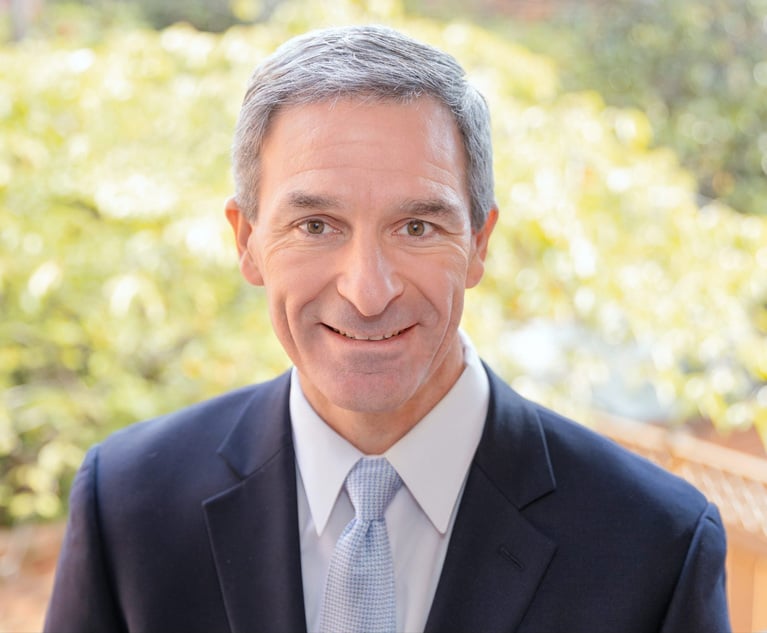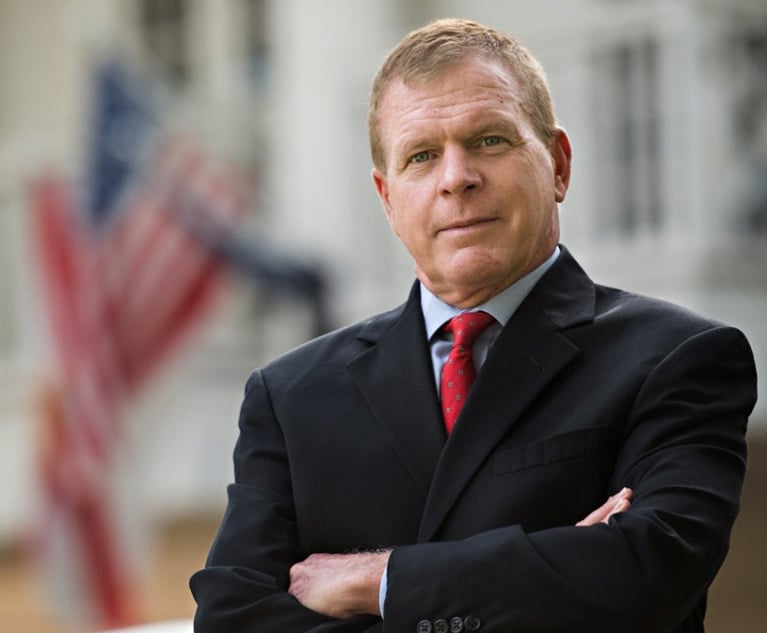Banks, DOJ Opinions Differ on Online Gambling
Nearly seven years ago, as American families busily prepared for Christmas, the U.S. Justice Department quietly released a legal opinion…
November 30, 2018 at 06:00 AM
6 minute read

Nearly seven years ago, as American families busily prepared for Christmas, the U.S. Justice Department quietly released a legal opinion reversing 50 years of interpretation of the federal Wire Act. It discarded the position of its own Criminal Division by arguing the law no longer covers internet gambling—as long as the wagers are not on sporting events or contests.
DOJ's goal: Make an end run around Congress and the courts to help cash-strapped states reap the rewards expected to come from converting Americans' cellphones into mobile slot machines.
But the world's most respected financial institutions, including American Express, Bank of America, JPMorgan Chase and Wells Fargo—who unlike DOJ have money on the line—see the situation differently.
There is no indication DOJ, in opening the door to online casinos, gave any consideration to how internet gambling invariably ensnares society's most vulnerable—underage youth, the poor and problem gamblers.
In the U.K., where online gambling is legal and ubiquitous, victims range from a 13-year-old boy —who lost £80,000 of his parents' money—to an elderly grandmother whose grandson lost nearly her entire life savings as a result of “an online gambling addiction.” A nonpartisan British think tank concluded “the online gambling industry obtains more than half of its profit from at risk and problem gamblers.”
Maybe this helps explain why these highly respected financial refuse to “process any money interactions on these sites.”
Likely though, the moment leading financial institutions knew to stay clear of online wagering was actually five years before a DOJ attorney decided it was OK for casinos to put slot machines on Americans' mobile devices—when Congress enacted the Unlawful Internet Gambling Enforcement Act. This law prohibits the use of U.S. financial instruments—credit cards, electronic fund transfers and checks—for “unlawful Internet gambling.”
Congress did not define the term “unlawful internet gambling.” At the time it was understood (as the Justice Department had informed Congress) that all forms of internet gambling were illegal under the Wire Act and other federal statutes. Congress did list some exceptions it did not consider to be covered (such as fantasy sports). But none of those exceptions allow casinos to offer slot machines on Americans' mobile devices.
In the hopes of exempting themselves from this law, online casinos have spuriously seized upon a narrow “intrastate safe harbor” provision tucked in the legislation. Their assertion of authority is misplaced—as I suspect the lawyers in our nation's most reputable financial institutions recognize.
The statute' authors made clear through the legislative history that the safe harbor was merely a technical amendment inserted to ensure that UIGEA did not unintentionally impede retail lottery terminals from interacting with a processing center within the same state or prevent casinos within a state from transmitting data to one another.
As Congress explained: “[t]he safe harbor would leave intact the current interstate gambling prohibitions such as the Wire Act, federal prohibitions on lotteries, and the Gambling Ship Act so that casino and lottery games could not be placed on websites and individuals could not access these games from their homes or businesses.”
Moreover, the Wire Act Opinion—upon which online casinos are hanging their hats—is wrong in its conclusion.
The Wire Act was one of three anti-gambling bills signed into law by President John F. Kennedy—and on the same day, no less. The intent was to sound the death knell for the chief funding source for organized crime: illegal gambling.
From Day One, all three laws were interpreted to cover all forms of gambling, whether wagering on sports, horse races, or on the “numbers racket” (that era's lotteries). This made sense because as was known to and discussed by the law's authors, all three forms of gambling relied on the wires—to relay bets; to transmit winning numbers, horses, or teams; and to “lay off” wagers (a form of syndication mobsters used to hedge their risk).
The Wire Act Opinion used tortured logic and neglected fundamental canons of statutory construction in concluding that somehow Congress meant to exempt lotteries from the Wire Act, despite the fact the “numbers racket” was the most lucrative form of gambling for the mob.
For example, the opinion cites DOJ testimony from 1961 stating the legislation covers sporting events only. But the opinion failed to disclose the bill language about which DOJ was testifying never became law.
The Opinion claims Congress, to exclude nonsports wagers, removed “two commas” in re-drafting the Wire Act. In fact, the actual legislative texts indicate the Senate Judiciary Committee did not “remove” commas, but rather struck and rewrote the entire provision.
It is also important to keep in mind that opinions issued by agency attorneys do not carry the force of law. Such opinions are simply guidance given to federal agencies as to how to enforce the law. They can be withdrawn or revisited at any time (as others have been in the past). And, they do not shield those companies that rely on them from liability or protect them from private claims.
Interviewed by Newsweek in 2014, the opinion's author, Virginia Seitz, conceded the document upon which online casinos are relying is “just that—an opinion.” When asked about the Opinion during her nomination proceedings, former Attorney General Loretta Lynch explained she was not aware of “any statute or regulation that gives OLC opinions the force of law.”
That America's most prominent financial service companies refuse to process online wagers speaks as loud as Ms. Seitz's candid words. As states rush to cash in on the Supreme Court's recent ruling permitting sports betting, it is instructive that, when it comes to online casino gambling, the country's biggest banks continue to favor the law over a unilateral decree rendered by a lawyer; the full force of law over a flimsy opinion.
Darryl Nirenberg is a partner at Steptoe & Johnson. Nirenberg is an international gambling law expert who serves as chief counsel to the Coalition to Stop Internet Gambling.
This content has been archived. It is available through our partners, LexisNexis® and Bloomberg Law.
To view this content, please continue to their sites.
Not a Lexis Subscriber?
Subscribe Now
Not a Bloomberg Law Subscriber?
Subscribe Now
NOT FOR REPRINT
© 2025 ALM Global, LLC, All Rights Reserved. Request academic re-use from www.copyright.com. All other uses, submit a request to [email protected]. For more information visit Asset & Logo Licensing.
You Might Like
View All


Restoring Antitrust: Returning to the Consumer Welfare Standard
Trending Stories
- 1States Accuse Trump of Thwarting Court's Funding Restoration Order
- 2Microsoft Becomes Latest Tech Company to Face Claims of Stealing Marketing Commissions From Influencers
- 3Coral Gables Attorney Busted for Stalking Lawyer
- 4Trump's DOJ Delays Releasing Jan. 6 FBI Agents List Under Consent Order
- 5Securities Report Says That 2024 Settlements Passed a Total of $5.2B
Who Got The Work
J. Brugh Lower of Gibbons has entered an appearance for industrial equipment supplier Devco Corporation in a pending trademark infringement lawsuit. The suit, accusing the defendant of selling knock-off Graco products, was filed Dec. 18 in New Jersey District Court by Rivkin Radler on behalf of Graco Inc. and Graco Minnesota. The case, assigned to U.S. District Judge Zahid N. Quraishi, is 3:24-cv-11294, Graco Inc. et al v. Devco Corporation.
Who Got The Work
Rebecca Maller-Stein and Kent A. Yalowitz of Arnold & Porter Kaye Scholer have entered their appearances for Hanaco Venture Capital and its executives, Lior Prosor and David Frankel, in a pending securities lawsuit. The action, filed on Dec. 24 in New York Southern District Court by Zell, Aron & Co. on behalf of Goldeneye Advisors, accuses the defendants of negligently and fraudulently managing the plaintiff's $1 million investment. The case, assigned to U.S. District Judge Vernon S. Broderick, is 1:24-cv-09918, Goldeneye Advisors, LLC v. Hanaco Venture Capital, Ltd. et al.
Who Got The Work
Attorneys from A&O Shearman has stepped in as defense counsel for Toronto-Dominion Bank and other defendants in a pending securities class action. The suit, filed Dec. 11 in New York Southern District Court by Bleichmar Fonti & Auld, accuses the defendants of concealing the bank's 'pervasive' deficiencies in regards to its compliance with the Bank Secrecy Act and the quality of its anti-money laundering controls. The case, assigned to U.S. District Judge Arun Subramanian, is 1:24-cv-09445, Gonzalez v. The Toronto-Dominion Bank et al.
Who Got The Work
Crown Castle International, a Pennsylvania company providing shared communications infrastructure, has turned to Luke D. Wolf of Gordon Rees Scully Mansukhani to fend off a pending breach-of-contract lawsuit. The court action, filed Nov. 25 in Michigan Eastern District Court by Hooper Hathaway PC on behalf of The Town Residences LLC, accuses Crown Castle of failing to transfer approximately $30,000 in utility payments from T-Mobile in breach of a roof-top lease and assignment agreement. The case, assigned to U.S. District Judge Susan K. Declercq, is 2:24-cv-13131, The Town Residences LLC v. T-Mobile US, Inc. et al.
Who Got The Work
Wilfred P. Coronato and Daniel M. Schwartz of McCarter & English have stepped in as defense counsel to Electrolux Home Products Inc. in a pending product liability lawsuit. The court action, filed Nov. 26 in New York Eastern District Court by Poulos Lopiccolo PC and Nagel Rice LLP on behalf of David Stern, alleges that the defendant's refrigerators’ drawers and shelving repeatedly break and fall apart within months after purchase. The case, assigned to U.S. District Judge Joan M. Azrack, is 2:24-cv-08204, Stern v. Electrolux Home Products, Inc.
Featured Firms
Law Offices of Gary Martin Hays & Associates, P.C.
(470) 294-1674
Law Offices of Mark E. Salomone
(857) 444-6468
Smith & Hassler
(713) 739-1250









